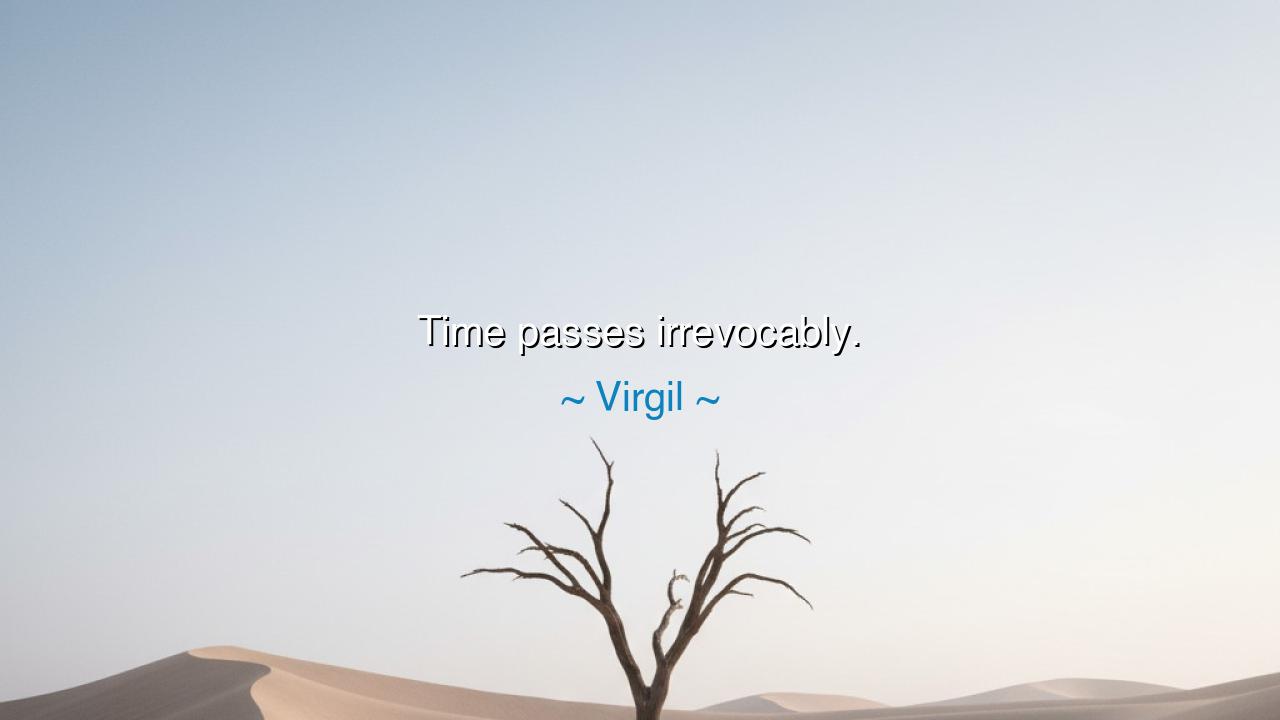
Time passes irrevocably.






The poet of Rome, Virgil, whose verses gave voice to both empire and eternity, wrote with solemn gravity: “Time passes irrevocably.” In these few words lies a truth that no crown, no army, no wealth can deny. Time is the river that flows without turning back, the arrow that never returns to the bowstring. It does not pause for kings, nor beg for mercy from the poor. It moves forward with quiet power, carrying with it our youth, our deeds, our very lives, until all are gathered into memory and dust.
The origin of this quote is found in Virgil’s Georgics, where he reflects upon the cycles of nature and the labors of man. As farmers toil through the seasons, they are reminded that time itself cannot be harnessed. The plough may cut the earth, the seed may sprout, but the days themselves march on, untouched by human will. Virgil, shaped by the fragility of life and the grandeur of empire, looked upon time not merely as measurement, but as an eternal law, a power above all powers.
The ancients, too, revered this truth. Heraclitus spoke of the river that no man may step into twice, for both the river and the man are forever changed. The Hebrews declared, “Our days are like a shadow that declineth.” The Stoics counseled that each passing day was a portion of life surrendered to death. Virgil’s phrase echoes all of these, yet with the weight of Roman fatalism: time lost is lost forever, and nothing may recall it.
History shows us this lesson in flesh and blood. Think of Napoleon Bonaparte, who once commanded Europe with fire and steel. Yet all his victories could not hold back the hours. The empire that rose swiftly fell as swiftly, and in his exile on Saint Helena, Napoleon himself must have felt the weight of Virgil’s truth—his time of power had passed irrevocably, and no longing could summon it again. Or consider the Library of Alexandria, once filled with knowledge gathered from the world. When flames consumed it, centuries of learning were lost to time forever, never to return.
The meaning of Virgil’s words is both sobering and inspiring. Sobering, because it reminds us that we cannot undo, cannot reclaim, cannot relive the hours gone by. They are sealed into the past, beyond the reach of kings and gods. But inspiring, because it reminds us of the fierce urgency of now. If time passes irrevocably, then every hour must be treasured, every day must be lived with purpose. The fleeting nature of time is not despair, but a call to action.
Therefore, the lesson is clear: do not waste the irretrievable gift. Do not delay the word of love, the act of courage, the pursuit of wisdom. For hesitation is theft, and procrastination is surrender. What is not done today cannot truly be done tomorrow—it will be another task, another day, another chance, but never the same. The moment is unique, and once passed, it is gone.
In practice, I counsel this: begin each morning by recalling Virgil’s warning. Ask yourself: “If today’s hours are lost forever, how shall I spend them to honor life?” Keep watch over your time as though it were treasure, for in truth it is the most precious wealth. Guard it from idleness, fill it with deeds of meaning, and savor even its simple joys. For though time passes, the way you use it endures in memory, in legacy, and in the souls you touch.
Thus, remember the eternal wisdom of Virgil: “Time passes irrevocably.” Let these words stir both urgency and reverence in your heart. Live with courage, act with love, labor with purpose. For time does not turn back, but the mark you leave upon it can echo long after you are gone. In this way, though the hours pass beyond recall, your life will not be lost to the river, but will shine upon its surface like light that endures.






AAdministratorAdministrator
Welcome, honored guests. Please leave a comment, we will respond soon